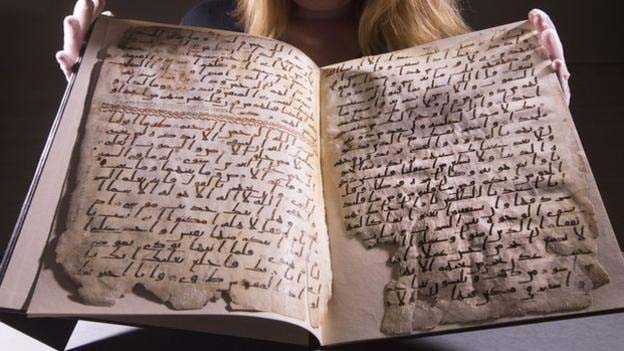
BBC online :
What may be the world’s oldest fragments of the Quran have been found by the University of Birmingham.
Radiocarbon dating found the manuscript to be at least 1,370 years old, making it among the earliest in existence.
The pages of the Muslim holy text had remained unrecognised in the university library for almost a century.
The British Library’s expert on such manuscripts, Dr Muhammad Isa Waley, said this “exciting discovery” would make Muslims “rejoice”.
The manuscript had been kept with a collection of other Middle Eastern books and documents, without being identified as one of the oldest fragments of the Koran in the world.
When a PhD researcher, Alba Fedeli, looked more closely at these pages it was decided to carry out a radiocarbon dating test and the results were “startling”.
The university’s director of special collections, Susan Worrall, said researchers had not expected “in our wildest dreams” that it would be so old.
“Finding out we had one of the oldest fragments of the Koran in the whole world has been fantastically exciting.”
The tests, carried out by the Oxford University Radiocarbon Accelerator Unit, showed that the fragments, written on sheep or goat skin, were among the very oldest surviving texts of the Koran.
These tests provide a range of dates, showing that, with a probability of more than 95%, the parchment was from between 568 and 645.
“They could well take us back to within a few years of the actual founding of Islam,” said David Thomas, the university’s professor of Christianity and Islam.
“According to Muslim tradition, the Prophet Muhammad received the revelations that form the Koran, the scripture of Islam, between the years 610 and 632, the year of his death.”
What may be the world’s oldest fragments of the Quran have been found by the University of Birmingham.
Radiocarbon dating found the manuscript to be at least 1,370 years old, making it among the earliest in existence.
The pages of the Muslim holy text had remained unrecognised in the university library for almost a century.
The British Library’s expert on such manuscripts, Dr Muhammad Isa Waley, said this “exciting discovery” would make Muslims “rejoice”.
The manuscript had been kept with a collection of other Middle Eastern books and documents, without being identified as one of the oldest fragments of the Koran in the world.
When a PhD researcher, Alba Fedeli, looked more closely at these pages it was decided to carry out a radiocarbon dating test and the results were “startling”.
The university’s director of special collections, Susan Worrall, said researchers had not expected “in our wildest dreams” that it would be so old.
“Finding out we had one of the oldest fragments of the Koran in the whole world has been fantastically exciting.”
The tests, carried out by the Oxford University Radiocarbon Accelerator Unit, showed that the fragments, written on sheep or goat skin, were among the very oldest surviving texts of the Koran.
These tests provide a range of dates, showing that, with a probability of more than 95%, the parchment was from between 568 and 645.
“They could well take us back to within a few years of the actual founding of Islam,” said David Thomas, the university’s professor of Christianity and Islam.
“According to Muslim tradition, the Prophet Muhammad received the revelations that form the Koran, the scripture of Islam, between the years 610 and 632, the year of his death.”

